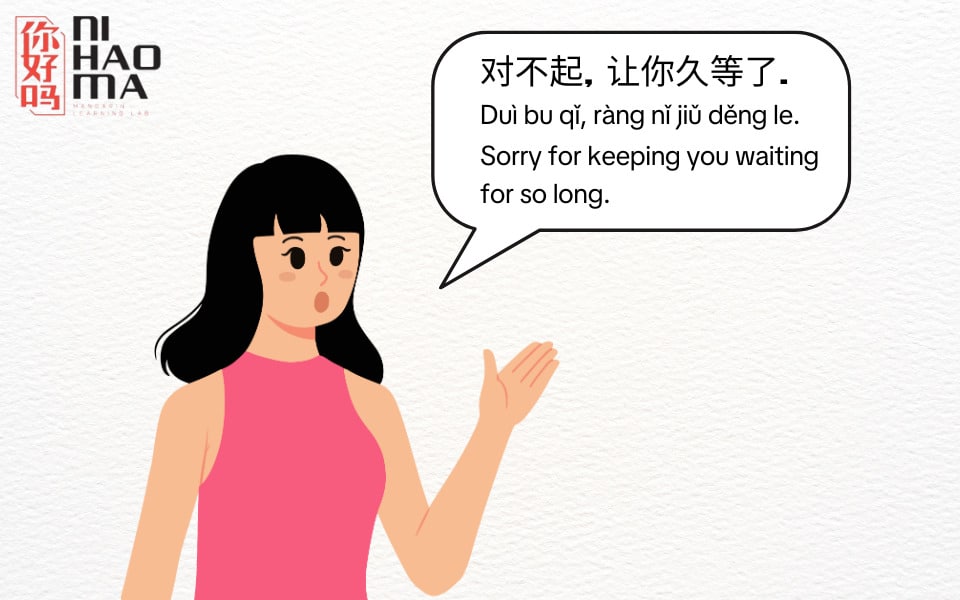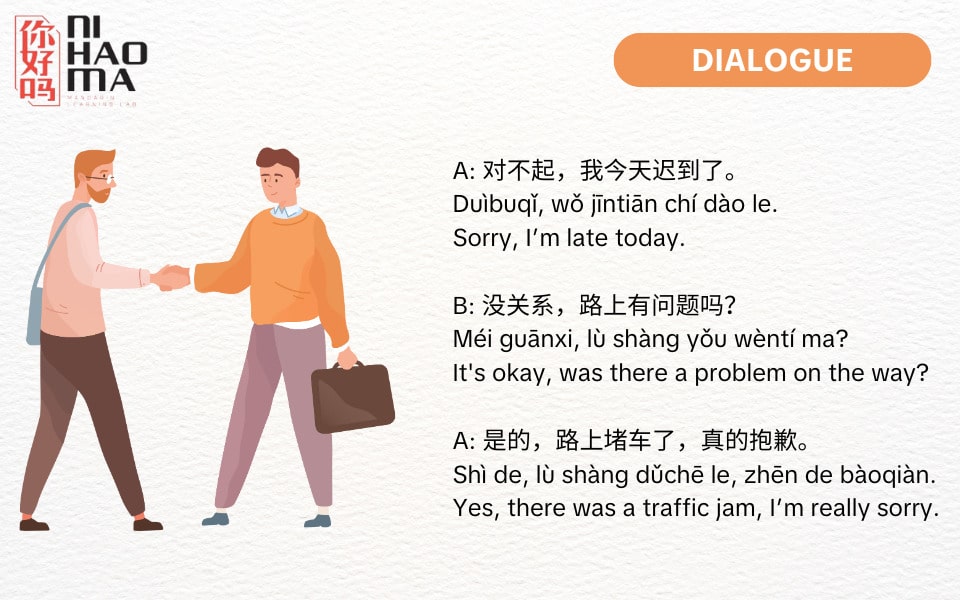Apologizing is an essential part of communication, no matter the culture or language. Knowing how to say sorry in Chinese not only shows respect for the other person but also helps build a positive impression in communication Let’s dive in and learn the art of saying sorry in Chinese!
How to Say Sorry in Chinese
Knowing how to say sorry in Chinese shows respect for the other person and helps build a positive impression in communication. Below is a list of commonly used Chinese apology phrases, along with their meanings and appropriate contexts, to help you use them effectively in different situations:
| Phrase | Pinyin | Translation | Usage Context |
|---|---|---|---|
| 对不起 | Duìbuqǐ | Sorry | For small mistakes or inconveniencing others. |
| 抱歉 | Bàoqiàn | Sincerely sorry | For more serious apologies or formal situations. |
| 不好意思 | Bù hǎoyìsi | Sorry, excuse me | For mild apologies, such as minor inconveniences or interruptions. |
| 请原谅 | Qǐng yuánliàng | Please forgive me | When asking for forgiveness for a mistake. |
| 是我的错 | Shì wǒ de cuò | It’s my fault | When fully admitting responsibility for a mistake. |
| 真是不好意思 | Zhēn shì bù hǎoyìsi | I’m really sorry | To emphasize your regret for something you’ve done. |
| 麻烦你了 | Máfan nǐ le | Sorry for troubling you | When apologizing for causing inconvenience to someone. |
| 打扰一下 | Dǎrǎo yīxià | Sorry to disturb you | When asking for permission to interrupt or disturb someone. |
| 请不要生气 | Qǐng bùyào shēngqì | Please don’t be angry | To calm the other person’s emotions after making a mistake. |
| 我真的很抱歉 | Wǒ zhēnde hěn bàoqiàn | I’m truly sorry | To express deep and sincere regret. |
| 实在对不起 | Shízài duìbuqǐ | I’m truly sorry | To convey the seriousness of your apology. |
| 是我的疏忽 | Shì wǒ de shūhū | It was my oversight | For apologizing for a mistake caused by carelessness. |
| 让你久等了 | Ràng nǐ jiǔ děng le | Sorry to keep you waiting | When apologizing for making someone wait. |
| 是我不好 | Shì wǒ bù hǎo | It’s my fault | For admitting your mistake in a friendly or close setting. |
| 很抱歉让你不开心了 | Hěn bàoqiàn ràng nǐ bù kāixīn le | Sorry for making you unhappy | When apologizing for hurting someone’s feelings. |
| 没有考虑周全 | Méiyǒu kǎolǜ zhōuquán | I didn’t think it through | When apologizing for a poorly thought-out decision or action. |
| 对不起,打扰您了 | Duìbuqǐ, dǎrǎo nín le | Sorry to disturb you | For interrupting or inconveniencing elders or superiors. |
| 下次一定注意 | Xià cì yídìng zhùyì | I’ll be more careful next time | When promising to correct your mistake in the future. |
| 我不是故意的 | Wǒ bù shì gùyì de | I didn’t mean to | To explain that a mistake was unintentional. |
| 很抱歉耽误了您的时间 | Hěn bàoqiàn dānwùle nín de shíjiān | Sorry for wasting your time | To apologize for wasting someone’s time, especially in meetings or work. |
| 我真不该那样做 | Wǒ zhēn bù gāi nàyàng zuò | I really shouldn’t have done that | To express self-blame and apologize for an action. |
| 对不起让您担心了 | Duìbuqǐ ràng nín dānxīn le | Sorry for making you worry | When apologizing for causing someone concern. |
| 这是我的责任 | Zhè shì wǒ de zérèn | This is my responsibility | When taking full responsibility for a mistake and committing to fix it. |

The above phrases not only help you express apologies appropriately but also contribute to building more positive relationships. Depending on the situation, choose the most suitable apology phrase. Additionally, there are a few key points to keep in mind:
- Tone and Attitude: Express sincerity through your tone of voice; avoid sounding indifferent or superficial.
- Propose Corrective Actions: Along with your apology, offer a solution or commitment to fix the mistake. This demonstrates your sense of responsibility and sincerity to the other person.
- Honorific 您 (nín): In Chinese culture, respecting elders and superiors is very important. When apologizing to them, use the honorific 您 (nín) instead of 你 (nǐ) to convey greater respect and formality.
Common Phrases to Respond to Apologies in Chinese
In daily communication, not only the way you apologize but also how you respond to apologies plays a crucial role in maintaining good relationships. When someone apologizes, your response can reflect your empathy, understanding, and politeness.
Here are some common phrases to respond to apologies in Chinese:
| Phrase | Pinyin | Translation | Usage Context |
|---|---|---|---|
| 没关系 | Méi guānxi | It’s okay | Used in all situations, especially to ease small mistakes. |
| 没事 | Méi shì | No problem | When you feel the mistake is not serious and want to reassure the apologizer. |
| 别放在心上 | Bié fàng zài xīn shàng | Don’t worry about it | To emphasize that you’re not bothered by the mistake. |
| 我可以理解 | Wǒ kěyǐ lǐjiě | I can understand | When you want to show understanding of the apologizer’s reasons or circumstances. |
| 不用担心 | Bùyòng dānxīn | No need to worry | To comfort someone, letting them know you’re not upset. |
| 下一次注意就好了 | Xià yī cì zhùyì jiù hǎo le | Just be careful next time | When encouraging someone to correct their mistake without putting pressure on them. |
| 我不介意 | Wǒ bù jièyì | I don’t mind | When you genuinely feel unaffected by the mistake. |
| 真没关系 | Zhēn méi guānxi | Really, it’s okay | To emphasize that the mistake is minor and not worth worrying about. |
| 谢谢你的道歉 | Xièxiè nǐ de dàoqiàn | Thank you for your apology | To express politeness and respect for the apology. |
| 没什么大不了的 | Méi shénme dàbùliǎo de | It’s no big deal | When the mistake is truly insignificant, and you want to reassure the other person. |
| 你不用自责 | Nǐ bùyòng zìzé | Don’t blame yourself | To help someone not feel guilty about their mistake. |
| 我已经忘了 | Wǒ yǐjīng wàng le | I’ve already forgotten about it | When you want to indicate you’re no longer bothered by the mistake. |
| 一切都会好的 | Yīqiè dōu huì hǎo de | Everything will be fine | To encourage someone after a significant mistake that they find hard to move past. |

Chinese Vocabulary Related to Apologies
When communicating in Chinese, it’s not just apology phrases that matter—your vocabulary related to this topic is equally important. These words help you express emotions, acknowledge mistakes, or respond to apologies more naturally.
Here’s a table of common vocabulary associated with apologies in Chinese:
| Vocabulary | Pinyin | Meaning |
|---|---|---|
| 错 | Cuò | Mistake, error |
| 误会 | Wùhuì | Misunderstanding |
| 补偿 | Bǔcháng | Compensation |
| 责任 | Zérèn | Responsibility |
| 和解 | Héjiě | Reconciliation |
| 原谅 | Yuánliàng | Forgiveness |
| 忏悔 | Chànhuǐ | Remorse |
| 宽容 | Kuānróng | Tolerance |
| 诚意 | Chéngyì | Sincerity |
| 承担 | Chéngdān | To take responsibility |
| 失礼 | Shīlǐ | Being disrespectful |
| 自责 | Zìzé | Self-blame |
| 不小心 | Bù xiǎoxīn | Careless, unintentional |
| 承认 | Chéngrèn | To admit |
| 无意 | Wú yì | Unintentional |
| 非常 | Fēicháng | Very, extremely |
| 严重 | Yánzhòng | Serious |
| 不安 | Bù’ān | Uneasy, anxious |
| 失望 | Shīwàng | Disappointment |
| 关心 | Guānxīn | Care |
| 处理 | Chǔlǐ | To handle |
| 调整 | Tiáozhěng | Adjustment |
| 修复 | Xiūfù | Restoration |
| 尊重 | Zūnzhòng | Respect |
Conclusion
No matter the situation, knowing how to use apology phrases in Chinese helps you respond naturally and tactfully. The phrases and vocabulary shared by Ni Hao Ma will make your Chinese communication more flexible and fluent. To explore more practical phrases, check out Ni Hao Ma’s Chinese-speaking courses today!



